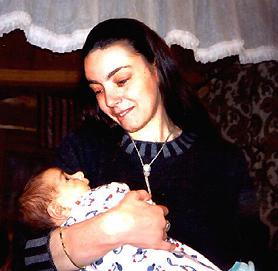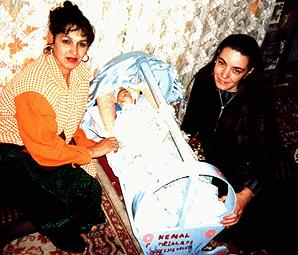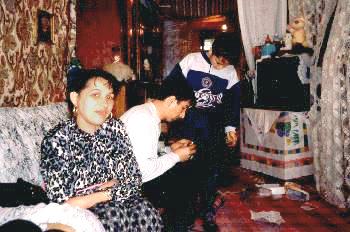At the outskirts of Florence, the
streets knot together in a complicated fashion, and a stream of asphalt
goes down to Il Poderaccio. This is a camp, under gigantic pylons, a jumble
of campers, plywood and sheet metal. A very sad dog lies in the pools of
water. Hisen and Hatmon are out, we are told that they have gone to the
Masini camp. Three hundred metres away on foot, yet another pylon and at
its feet,mud, campers without wheels or windows, and yet more sheet metal
and plywood.
Hatmon recognizes and comes towards us. She
is tall and pretty, and a new life is very clearly in her belly. With her
long skirt, embarrassed and frightened, she begs for alms at a traffic
light in Florence, looked down upon both by the good Italians and by the
other "Gypsies" who have been begging all their lives - she had never done
anything like this before, and had no idea how to go about it. It was here
that she met Lisa.
Hatmon has three children already, but she
does not take them begging. She has no intention of taking advantage of
her children, and she has even managed to send them to school.
Hatmon was born in Kosovo. She is a Gurbetija,
a branch of the Roma that some claim stems directly from an Indian caste.
She is married to Hisen, a Rom from a Kosovo family, who however used to
live in Sarajevo, where they had a stall in the market for selling
clothes and a little house. Hisen has a strong, handsome face, he could
look like an Italian were it not for that special touch of sadness which
marks those who have lived too long in a camp.
The war came: they used to eat bread and
at times grass, and once a day they managed to get a glass of milk. A bomb
fell, killing Hisen's father, and Hatmon lost a child in her womb from
the shock. Hisen was wounded and sent to Italy to be cured. While he was
away, his brother, a street sweeper, gathered corpses in the streets of
Sarajevo and Hatmon's mother-in-law started to beat her, forcing to flee
to Kosovo.
Hatmon shows us a picture of a child. It
is her younger brother. Where is he? In Belgrade. And why? A comando of
Albanians had attacked a train in Kosovo with hand grenades. One of the
passengers on the train was Hatmon's brother. He was on his way to school,
and lost his leg. Today, he is in an institution for war victims in Belgrade.
Slowly and patiently, a black vulture always
flies over the Roma. The vulture found her in Prishtina. From the sky,
Clinton's bombs, from the earth, the KLA. Hisen went to pick up his wife
in Kosovo, with two years of money gathered begging. Just before they left,
she became pregnant again. On the boat, they took a Kosovar cradle for
their child. Now, Hatmon is going to give birth to her fourth child. Who
came to Italy hidden in the deepest part of his mother's body, where not
even the Montenegro criminals could make him pay his passage. Senad grew
inside his mother as she stood begging in winter.
Hisen and Hatmon went to the Bosnian consulate
to renew their passports. Now they have to pay over 350 dollars for them,
just as Hatmon is about to have a child.
Now Senad has come into the world. Lisa is
his godmother.
 Lisa and her godchild, Senad
Lisa and her godchild, Senad
Hisen has been relatively lucky. Out of so
many people in the camp, he has found a job as bricklayer, and he does
have papers. His children are healthy, and for four months his wife - while
she gives milk to Senad - cannot be driven out of her home. Only the future
will tell...
 Hatmon, Senad in the cradle, and Lisa
Hatmon, Senad in the cradle, and Lisa
You are welcome to use this article
on condition that you put the whole text of "Collateral Lives" on your
website and provide a link to http://www.kelebekler.com/
